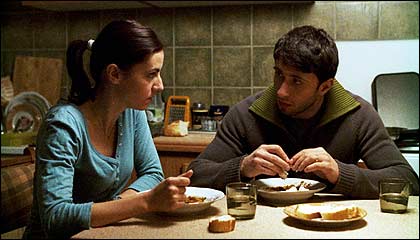
MOVIE REVIEW ARCHIVE | THEATER INFO |
By the Book
A crime film without a crime?
by Jason Blair
POLICE, ADJECTIVE: Written and directed by Corneliu Porumboiu. Cinematography, Marius Panduru. Starring Dragos Bucur and Vlad Ivanov. IFC Films, 2009. Unrated. 113 minutes. ![]()
 |
Early in Police, Adjective, a film that reasserts Romania’s new prominence in cinema, two policemen argue halfheartedly about staying fit. Cristi (Dragos Bucur), our taciturn hero, is discouraging a colleague from attempting foot-tennis, a game which combines soccer’s agility with the court-and-net awareness of volleyball. Cristi’s argument is that soccer skills are a prerequisite for foot-tennis; since the colleague can’t play soccer, he needn’t embarrass himself at foot-tennis. The colleague asks why mediocrity in one sport implies mediocrity in another. It’s a law, says Cristi. “Is it written down somewhere?” asks the colleague. “No,” says Cristi, “but it’s still a law.” For a cop, the childlike Cristi places great faith in what he can’t see. His idea of the world is nuanced and idealistic, putting him squarely at odds with other policemen in his unit.
Cristi is in the final stages of what appears to be a simple case. A boy has been accused by another boy — in Romania, informants are referred to as “denouncers” — of dealing marijuana. Cristi, after tailing the accused for several days, comes to the conclusion that the case has no merit. His argument is two-fold: One, the kid isn’t dealing, a fact Cristi knows after days of observation, and two, smoking marijuana shouldn’t by itself be grounds for punishment. In fact, Cristi believes the informant, whom Cristi refers to as a “squealer,” is actually dealing the drugs himself. But when Cristi tries to make a larger point about Romania’s misguided marijuana policy — nowhere else in Europe can you be arrested for smoking a joint, argues Cristi — he immediately loses the attention of his superiors. The next thing he’ll lose is his job.
Context is critical to the experience of Police, Adjective. Cristi is part of a repressive state he can no longer support. While the time is the present day, the city of Brasov has the grey, flat look of the Cold War era, and the values Cristi encounters are clearly reminiscent of hardline socialism. When Cristi insists the accused isn’t dealing, his supervisors reply, “As far as you know.” The modus operandi here is to make the case, then sort it out later.
The film is tedious and deliberate after the fashion of Cristi’s case, which tends to involve Cristi watching kids being kids from a distance, but Police, Adjective is never boring. From his endless walks across the city to his slow chewing of bread over dinner, Cristi is experiencing the slow exercise of an idea into a philosophy, a deeply felt belief into a position. He’ll need all the strength he can muster, it turns out, because he’s on a collision course with Captain Anghelache (the imposing Vlad Ivanov of 4 Months, 3 Weeks and 2 Days), a man he’s been avoiding the entire film. In a scene of great finesse and power, the Captain calmly interrogates Cristi by testing his ability to define his convictions. Then they bring in the dictionary.
Both a Jury Prize winner at the Cannes Film Festival and the Romanian entry for Best Foreign Language Film at last year’s Oscars, Police, Adjective continues the recent resurgence in Romanian film. Writer and director Corneliu Porumbiou (12:08 to Bucharest), along with colleagues Criti Piui (The Death of Mr. Lazarescu) and Cristian Mungiu (4 Months, 3 Weeks and 2 Days) are addressing communism and its aftermath in ways that are humane, comical and bleakly ironic. If you enjoy carefully made, quietly profound films — and aren’t put off by a deliberate pace — you should find Police, Adjective worth looking up.
Police, Adjective opens Friday, May 21, at the Bijou.